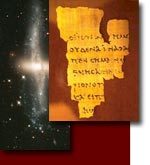| Site Map | Contacts | Links | Newsletter | |
Genesis 1:3-5 DAY 1
Day One
Hebrew Text
dja <wy - Day One
The Hebrew word <wy, day is used three different ways in this section. In Genesis 1:3 the light is called day which would be about 12 hours. At the end of this verse it says that it was evening and morning day one which would be 24 hours. Then in Genesis 2:4 it says, "in the day that the Lord God made the earth and the heavens." Here <wy refers to the six days of creation. The phrase "in the day" is beyom which means "when." Beyom is used at the beginning of ANE creation stories.
Psalm 90:4 says, "For a thousand years in thy sight are but as yesterday" and 2 Peter 3:8 says, "But, beloved, be not ignorant of this one thing, that one day is with the Lord as a thousand years, and a thousand years as one day.
The "Day of the Lord" seems to be a period of time not just 24 hours. So one must depend on the context to determine what the meaning of "day" is.
In Genesis one creation is seen as the dawning of a new day. Maybe the six double hours of day (Babylonian time) are parallel to the six days of creation which may come from the phases of the six day moon cycle (Enuma Elish V:16).
The ancient Jews would not have read a Day-Age theory into Genesis one. They would understood these days as regular 24 hour days. There is the question, Did the day begin at evening or morning? For the Jews the day begins with the evening at dusk. For example, the Sabbath begins on Friday evening (See Stroes 1966, 473; VT 16; Westermann, 115).
In ancient times the phrase dja <wy meaning "day one" was much discussed, because the cardinal number (one) is used as opposed to the ordinal (first) as in the rest of this chapter (Bowker 1969, 103). A look at other ancient languages show a similar use. Loewenstamm concludes, "The use of the phrase "one day" for "a first day" stands midway between Proto-Semitic (Ugaritic) which did not express the concept of "first" at all, and the developed language which assigned a special word for this concept" (1980, 16).
Ugaritic Texts
Cryus Gordon writes, "the first day of the week is not called yom rison 'First Day' but yom ehad 'Day of One.' Inasmuch as ehad 'One' is a name of God, the first day of the week may well be named after the great God who was number One in the ancient pantheon, and alone survives as the only God in the historic monotheisms. This process is already attested in a ritual tablet from Ugaritic, where the first day is called ym ahd (and not pr’ ym 'first day') (1979, 299-300; UF 11; UT 29.1-3; 19.14-19; 49 V.22; 55.5,29; 56.16,21,35). Loewenstamm’s view seems to be the better explanation of "day one." Let’s look at a few passages.
Aqhat says, "Behold! a day and a second he fed the Kotharat and gave drink" (Gibson, 106; KTU 1.17.II.32-3; COS, 345; ANET, 150). Here there is no need for a number for just one. It is just named. Numbering starts after one.
Keret says, "Go a day and a second, a third, a fourth day, a fifth, a sixth day; then with the sun on the seventh (day)" (Gibson, 85; KTU 1.14.III.2-4; COS, 335; ANET, 144; see also KTU 1.14.V.3).
In the Baal Cycle the temple of Baal was built in seven days which says, "Behold! a day and a second the fire consumed in the mansion" (Gibson, 62; KTU 1.4 VI.24). There is no use of "one" or "first" here.
Akkadian Literature
In the Gilgamesh Epic "one day" is used like in Genesis one, instead of the "first day." The Gilgamesh Epic says, "One day, a second day, Mount Nisir held the ship fast, Allowing no motion" (ANET, 94; Heidel 1946, 86). On the seventh day a dove is set free.
Jewish Literature
Josephus says, "This should be the first day, but Moses spoke of it as 'one' day. (LCL, 242, 15: Jewish Antiquities Book 1:29). Josephus does not take the time to explain the reason for this.
Philo in On The Creation (35) says, "its Maker called Day, and not 'first'’ day but 'one,' and expression due to the uniqueness of the intelligible world, and to its having therefore a natural kinship to the number 'One' (LCL, 226, 27). In another place Philo says, "Creation cannot have taken place in six natural days, for days are measured by the sun’s course, and the sun is but a portion of creation" (Philo 1929, xiii).
In Genesis Rabbah R. Yannai says that "one day" refers to the "Day of Judgment" (Neusner 1985, 34). R. Tanhum says, "It was the day on which unique things were made, heaven, earth, and light" (Ibid). There is also a listing of other important events that happened on the first day of the week (Ibid, 35).
Next - Creation of the Firmament
Bibliography
